|
|
|
Sort Order |
|
|
|
Items / Page
|
|
|
|
|
|
|
| Srl | Item |
| 1 |
ID:
166776
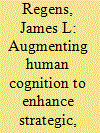

|
|
|
|
|
| Summary/Abstract |
The unprecedented increase in the volume and velocity of data collected by open source and classified platforms is simultaneously disrupting and transforming the intelligence enterprise. This article posits a technology-based approach for augmenting human cognition by leveraging high-performance computing and artificial intelligence applications to enhance the intelligence enterprise’s capability to identify, synthesize, and act on the key intelligence-relevant information elements embedded in those data. Adapting AI to the intelligence enterprise and national security decisions more broadly thus facilitates rapidly bringing to bear the essential human element of interpreting context and intent amid an otherwise insurmountable cascade of data.
|
|
|
|
|
|
|
|
|
|
|
|
|
|
|
|
| 2 |
ID:
166775


|
|
|
|
|
| Summary/Abstract |
National Intelligence Estimates are consensus-driven intelligence products. Yet there is considerable evidence supporting the use of competitive intelligence at every level of activity, including the presentation of finished products to consumers. We examine NIEs from two important periods in US foreign policy: the buildup in Vietnam and Gorbachev's reforms. We find in both cases alternate viewpoints were not presented in the US IC's premier intelligence product when such views could have made a difference. Consistent with contemporary findings in cognitive psychology, we argue the manner in which NIEs are structured and presented should be reformed to offer better decision support.
|
|
|
|
|
|
|
|
|
|
|
|
|
|
|
|
| 3 |
ID:
166777


|
|
|
|
|
| Summary/Abstract |
This article considers an episode of the television drama-documentary series Spy!, broadcast on the British Broadcasting Corporation in 1980. The programme proved controversial owing to its depiction of a physical assault during interrogation at an MI5 facility, Camp 020, during the Second World War. Numerous 020 veterans complained, pointing out that, with one exception, such physical violence had never taken place there. As their complaints were largely made in private correspondence with the BBC, which stood by its programme, the association of wartime British intelligence with physical abuse was allowed to go unchallenged in the minds of the viewing public.
|
|
|
|
|
|
|
|
|
|
|
|
|
|
|
|
| 4 |
ID:
166774


|
|
|
|
|
| Summary/Abstract |
This article analyzes the Russian Federal Security Service (FSB) intervention in the process of popular culture production in Russia. After briefly discussing the KGB precedent, I focus on the FSB annual art awards established in 2006. Although these awards include six categories and three prizes per each category plus honorable mentions, due to the length limitations, I focus only on the first prize winners of the literature award (awarded for fiction, nonfiction, and journalism). The key questions I investigate are, first, what kinds of literary works the FSB deems worthy of the first prize and, secondly, what the FSB literary taste conveys about the self-image that it has sought to construct for domestic and international audiences as well as about its strategic orientation. I conclude that the FSB has a predilection for spy fiction based on real historical events and personalities. Some of the first prize winners are biographies and reference books, but the majority can be categorized as historical fiction. Not surprisingly, they depict self-confident and patriotic intelligence officers who ultimately, though not without a lot of effort, overcome the assorted villains: the tsarist officers, the criminal gangs, the corrupt officials and turncoats in contemporary Russia and, last but not least, the CIA operatives. Curiously, though they generally deal with the threat from the West, many FSB-awarded historical novels are set in the Russian Central Asian or Far Eastern regions. The emerging thematic patterns reveal the contours of the present and future FSB strategic orientation.
|
|
|
|
|
|
|
|
|
|
|
|
|
|
|
|
| 5 |
ID:
166778
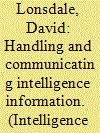

|
|
|
|
|
| Summary/Abstract |
Effective communication of information is essential to intelligence work. This paper identifies the main obstacles to good communication: policy-related challenges; cognitive impediments; resource limitations; cultural and structural issues within intelligence communities; and technical information. To illustrate, it examines four cases when poor communication contributed to intelligence shortcomings. Via questionnaire and document survey, the study identifies the current state of practice in UK intelligence communities. The survey of visualization documents currently in use revealed errors against established principles of Information Design. Thus, to ensure better handling and dissemination of intelligence, there is a distinct need to apply Information Design principles.
|
|
|
|
|
|
|
|
|
|
|
|
|
|
|
|
| 6 |
ID:
166779
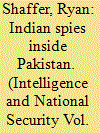

|
|
|
|
|
| Summary/Abstract |
This article examines India’s historical efforts to spy inside Pakistan from the mid-1960s to the early 1970s. It draws from memoirs of notable Indian spies who were jailed for espionage in Pakistan and spy ‘fiction’ written by former Indian intelligence and military officers who allege their writing is based on actual cases. The article highlights commonalities among Indian spies using the words of Indian officers to better understand human intelligence efforts inside Pakistan. It finds that Indian spies in these books have initially been Hindus or from multi-religious families, from the Indian-Pakistan border and have been poorly treated by the Indian government and its intelligence services.
|
|
|
|
|
|
|
|
|
|
|
|
|
|
|
|
| 7 |
ID:
166780
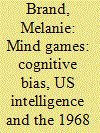

|
|
|
|
|
| Summary/Abstract |
This article examines the impact of cognitive bias on the analytic output of the United States intelligence community during the Prague Spring. Utilising a range of primary sources, including declassified documents, oral history and contemporary accounts, this article argues that as a result of heuristic biases, analysts formed the mindset that the Soviet Union would not invade Czechoslovakia, and did not alter that assumption in the face of increasing evidence to the contrary. Consequently analysts possessed a distorted understanding of both Soviet intentions and the prevailing political environment and did not accurately convey the likelihood of military action to consumers.
|
|
|
|
|
|
|
|
|
|
|
|
|
|
|
|
| 8 |
ID:
166773
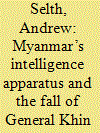

|
|
|
|
|
| Summary/Abstract |
As Myanmar’s Chief of Intelligence from 1983 until 2004, General Khin Nyunt presided over the development of a large and powerful security apparatus that underpinned military rule and played a major role in the country’s international relations. So influential did the key military intelligence organisation become, however, that it was seen as a threat by other parts of the armed forces, including the ruling State Peace and Development Council. In 2004, Khin Nyunt was arrested and his intelligence empire largely dismantled. The purge seriously weakened the regime’s capabilities, but was considered necessary to maintain its position as the supreme arbiter of power in Myanmar.
|
|
|
|
|
|
|
|
|
|
|
|
|
|
|
|
|
|
|
|
|